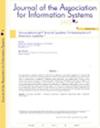Organizations as Digital Enactment Systems: A Theory of Replacement of Humans by Digital Technologies in Organizational Scanning, Interpretation, and Learning
IF 5.5
3区 管理学
Q1 COMPUTER SCIENCE, INFORMATION SYSTEMS
引用次数: 0
Abstract
Digital transformation has become a dominant phenomenon of interest among information systems scholars. To account for this phenomenon, it is imperative to develop a theoretical understanding of its processes and objects. We adapt a seminal organizational theory that conceptualizes organizations as interpretation systems to a possible future of organizations. We theorize digital transformation as a progressive replacement of humans by digital technologies in performing an organization’s fundamental activities underpinning the processes of scanning, interpretation, and learning that encompass an organization’s interaction with its environment. As a result, organizations cease to be human interpretation systems and instead turn into digital enactment systems, where digital technologies, instead of humans, nearly autonomously create and act upon information. We illustrate this digital transformation theory using the example of high-frequency trading. This transformation redefines the relationship among organizations, information, and the environment, changing the role of humans and reshaping strategic decision-making. Thus conceived, digital transformation offers a concrete way of theorizing and accounts for deep implications on the nature of organizations and organizing in the digital age.组织作为数字制定系统:组织扫描、解释和学习中数字技术替代人类的理论
数字化转型已成为信息系统学者感兴趣的主要现象。为了解释这一现象,必须从理论上理解其过程和对象。我们采用了一种开创性的组织理论,将组织概念化为解释系统,以适应组织的可能未来。我们将数字化转型理论化为数字技术在执行组织的基本活动中逐步取代人类,这些活动支撑着组织与环境互动的扫描、解释和学习过程。因此,组织不再是人类的解释系统,而是变成了数字制定系统,在这个系统中,数字技术取代了人类,几乎自主地创造和行动信息。我们用高频交易的例子来说明这个数字化转型理论。这种转变重新定义了组织、信息和环境之间的关系,改变了人的角色,重塑了战略决策。因此,数字化转型提供了一种具体的理论化方式,并解释了数字时代组织和组织性质的深刻影响。
本文章由计算机程序翻译,如有差异,请以英文原文为准。
求助全文
约1分钟内获得全文
求助全文
来源期刊

Journal of the Association for Information Systems
工程技术-计算机:信息系统
CiteScore
11.20
自引率
5.20%
发文量
33
审稿时长
>12 weeks
期刊介绍:
The Journal of the Association for Information Systems (JAIS), the flagship journal of the Association for Information Systems, publishes the highest quality scholarship in the field of information systems. It is inclusive in topics, level and unit of analysis, theory, method and philosophical and research approach, reflecting all aspects of Information Systems globally. The Journal promotes innovative, interesting and rigorously developed conceptual and empirical contributions and encourages theory based multi- or inter-disciplinary research.
 求助内容:
求助内容: 应助结果提醒方式:
应助结果提醒方式:


